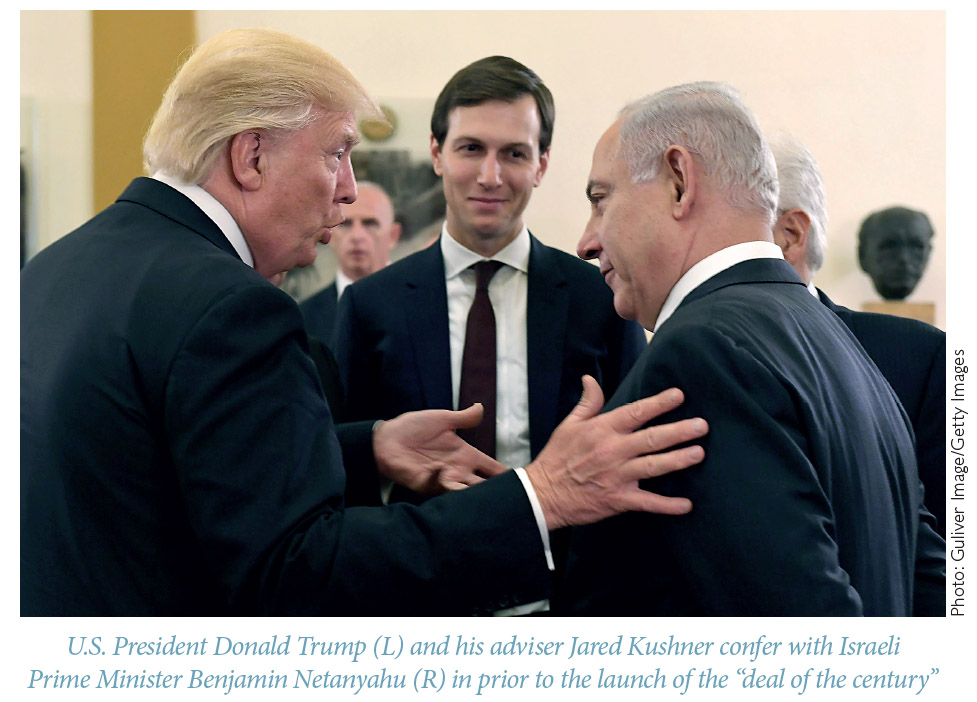
 Amos Yadlin is the Director of Israel’s Institute for National Security Studies (INSS). From 2006 to 2010, he was chief of Israeli military intelligence. You may follow him on Twitter @YadlinAmos Ari Heistein is a Research Fellow and Chief of Staff to the Director of INSS. You may follow him on Twitter @ariheist.
Amos Yadlin is the Director of Israel’s Institute for National Security Studies (INSS). From 2006 to 2010, he was chief of Israeli military intelligence. You may follow him on Twitter @YadlinAmos Ari Heistein is a Research Fellow and Chief of Staff to the Director of INSS. You may follow him on Twitter @ariheist.
The “deal of the century” launched by U.S. President Donald Trump was well-received in Israel after its January 2020 launch in Washington. The two major Israeli political parties, Likud and Blue and White, assessed that it was favorable to Israel and declared their support for it. The proposal’s incorporation of the country’s security requirements and other core interests resulted in a program aimed at separating from the Palestinians and ending the conflict under favorable conditions for Israel.
Yet there was a great deal of uncertainty regarding the function of Trump’s proposal. The president himself and his ambassador to the United Nations, Kelly Craft, described it as a basis for negotiations. Other officials appeared to express an understanding that this initiative was “all or nothing,” meaning that it would be shelved if both parties could not agree to its terms in their entirety. And still others explained it as allowing for unilateral Israeli action following an out-of-hand Palestinian rejection, either in the months following the plan’s release or at the end of the four-year period allocated for the plan’s implementation.

More important than the procedural elements of the “deal of the century,” however, is the question of where it might lead Israel and what vision for the country it advances. Is the aim unilateral annexation, which Prime Minister Benyamin Netanyahu hopes to accomplish in the summer of 2020, and precluding the realization of a two-state solution? Or is it a Jewish, democratic, secure, and morally just Israel existing alongside a Palestinian entity? This essay has been authored with the objective of averting the former course of action, which would be harmful to Israel’s future and international standing, while advancing the latter.
Long-term Decline
Thrice in recent decades—in 2000, 2008, and 2014—the Palestinian Authority (PA) failed to accept peace proposals in-line with what the United States and the international community deemed a just two-state compromise to end the conflict. The PA was unwilling to compromise on key issues regarding recognition of Israel’s Jewish character and its security needs because it believed its strategy to hold out for a better deal provided it with ample leverage: either Israel could be pressured to make additional concessions, or it would refuse to do so at great peril and slowly bring itself toward a one-state solution that undermined its future.
The result of the Palestinian approach—beyond the rejection of three opportunities to achieve a peaceful resolution to the conflict based on the two-state solution—has been a long-term decline in the situation. The terror group Hamas’s 2007 takeover of the Gaza Strip has intensified the conflict and placed many innocents in danger. Since then, Hamas has launched a relentless campaign of rocket fire against the citizens of southern Israel which disrupts their daily lives, the conditions for Gazans under its rule have declined considerably and may approach humanitarian catastrophe in the next decade, and the Palestinian territories have fractured into two separate entities incapable of reconciliation.
Despite the current negative trends, which would appear to incentivize the parties to reach an agreement sooner rather than later, it is unlikely that an “ultimate deal” or permanent agreement is in the offing. The Palestinian leadership remains divided in a bitter Hamas-Fatah rivalry that makes any two-state solution un-implementable. In addition, the decrepit state of the PA, which is both extremely unpopular among the residents of the West Bank and losing international funding—due to its payment of salaries to terrorists as well as its rejection of the American-led peace initiative—provides good reason to question whether this entity could conceivably survive independently and avoid state failure. But even if those issues could be resolved in short order, decades of conflict and mutual recriminations about previous failed efforts to achieve peace have led to the dwindling of political will on all sides to reach a resolution.
Even prior to the public release of the “deal of the century,” the Palestinian issue had declined as a priority on both the global and regional agendas. Presumably this was the result of the perceived intractable nature of the conflict, which numerous peace initiatives over the course of several decades had failed to resolve. Shortly after the Trump Plan’s release, it appeared as if the outbreak of the global coronavirus pandemic might overshadow the initiative and shelve it for the foreseeable future. However, recent political developments in Israel make that unlikely.
The April 2020 coalition agreement between Israeli political parties Likud and Blue and White allows Netanyahu to raise the issue of annexing segments of the West Bank on the basis of the Trump Plan as early as July 2020.
Instead of rushing to annex large swaths of land, which would render any two-state peace plan irrelevant and could damage some of Israel’s strategic assets—including relations with the United States, EU, Egypt, and Jordan—we recommend that Israel adopt a comprehensive approach to the problem to reverse the negative trends in the Israeli-Palestinian arena and create the conditions that will be more conducive to a future agreement between the parties.
The Trump Plan should be leveraged to advance a solution, but its terms should not confine efforts to do so. In addition, it is important that Israeli efforts to ensure the country’s future seek out Palestinian cooperation, but they must not depend on it.
A Way Forward
In looking to the future, Jerusalem should strategize for the four-year timeline described in the Trump Plan. During this period of four years, Israel should seek to change the current state of relations between the parties, build trust, advance the peace process, and break out of the stalemate that has defined the Israeli-Palestinian political dynamic for the past decade.
To that end, the Israeli government should take three initial measures. First, it should clarify that its long-term aim is to separate from the Palestinians, not to annex all West Bank territories. Second, it should declare the favorable parameters of the “deal of the century” to be a basis for negotiations with the Palestinians rather than a diktat that Palestinians must accept as is. Third, whether the Palestinians partake in a process to advance a peaceful resolution to the conflict or elect to continue along the path of rejectionism, Israel should clarify that it will not endanger the lives of its citizens by compromising on issues critical to its national security.
Next, Jerusalem should call to renew bilateral negotiations within the framework of an international summit that includes the participation of key regional and global stakeholders. Historical experience indicates clearly that the sides cannot be forced into concessions by external pressures, but progress in bilateral talks can be encouraged through economic and diplomatic incentives as well as security guarantees provided by outside parties. To be sure, bridging the formidable gaps between the two sides remains an extremely difficult and time-consuming task. In an optimistic scenario, the Israelis would attend the summit with the parameters of the “deal of the century” in hand as a basis for negotiations while the Palestinian leadership, with the formal support of the Arab world, would call for the implementation of the 2002 Arab Peace Initiative.
The negotiating process would require Israel to stand firm on several key elements of the Trump parameters: security arrangements that provide it with freedom of action in the name of self-defense; restricting the return of Palestinian refugees to a future Palestinian state; required recognition of Israel as a Jewish state and Jerusalem as its capital; and international recognition of the major settlement blocs as part of Israel (it has long been clear that they would neither be evacuated nor incorporated into a Palestinian state).
However, the Trump Plan also contains some provisions that are superfluous to Israel’s core requirements and thus provide Jerusalem with considerable flexibility to make concessions without compromising its national security interests. Some of the issues on which Israel should be willing to concede are: the annexation of 120 isolated settlements as mapped out in the Trump parameters, which creates long and winding boundaries stretching an additional 1800 kilometers; the land swaps in the Negev Desert along Israel’s border with Egypt; and the demographic shifts accompanying the implementation of particular aspects of the plan.
In parallel, and in preparation for the possibility that a permanent and comprehensive agreement will fail to materialize in the immediate future, Israel ought to take steps to reduce the level of conflict and improve the reality on the ground.
This approach should seek to advance four principle goals:
- keeping the two-state solution as a viable option for the future;
- laying the foundation for building a functional and viable Palestinian entity;
- preventing the emergence of another round of fighting between Israel and Hamas in Gaza, or unrest and violence in the West Bank; and
- seeking to reach a long-term agreement with Hamas in Gaza which would ideally herald the PA’s return to control of the Gaza Strip.
Seeking to achieve these goals will require establishing mechanisms of communication and coordination with the PA, and even Hamas; the hope is that the continuous conversation between the parties will facilitate the steady improvement of the daily lives of Israelis and Palestinians in the short-term while moving the broader strategic situation closer to the possibility of resolution in the long-term.
Six Necessities
To that end, we have identified six realms in which actions and partnership will be necessary to minimize the conflict and reverse the existing negative trends.
First, in terms of security, Israeli cooperation with Palestinian counterparts in the PA security services should be strengthened to the extent possible. In order to reduce friction, Israel should seek to the most minimal role that it can in the West Bank without compromising its citizens’ security. At the same time it must maintain its freedom of action in accordance with existing arrangements which allow it to take whatever actions are necessary in order to thwart attacks by Palestinian terror groups.
Second, with regards to Gaza, Israel should aim for a long-term ceasefire arrangement with Hamas during which the extent of human misery can be alleviated among Gaza’s population and the residents there can achieve decent standards of living. The negotiations between Israel and Hamas should be anchored in the Quartet’s parameters for such an agreement from 2006: recognition of Israel, honoring agreements signed between Israel and the PA, and Hamas halting and condemning terror operations.
In addition, the terms reached following Operation “Protective Edge” in 2014 ought to be implemented under a mechanism that ensures that Hamas’s terror capabilities do not exploit the period of quiet in order to expand the threat posed to Israeli civilians. Should it prove impossible to reach or enforce such an agreement between the two parties, Israel should consider initiating a campaign which decimates the military capabilities of Hamas and Palestinian Islamic Jihad (an Iranian proxy group) while establishing a political mechanism for ending the conflict and allowing for the return of PA control to Gaza.
Third, on the economic and development front, Israel should encourage the injection of capital into the Palestinian economy as envisioned by the Trump Plan. The provision of aid to Palestinians should depend on their productive cooperation toward resolving the conflict, not on their unreserved acceptance of all of President Trump’s parameters.
Israel can also play a role in improving the state of the Palestinian economy through three key measures. First, it could opt to increase the number of work permits that Israel provides to Palestinians seeking to earn a living by working in Israel. Second, it could promote the establishment of specific industrial zones in Palestinian areas in order to advance the cause of greater Palestinian economic self-sufficiency. Third, Israel should strongly consider how to ensure its security while implementing the prospective projects of a Gaza seaport as well as the establishment of an airport in Egypt or Jordan to serve Palestinian needs.
As for the infrastructure problem in Gaza, including but not restricted to electricity, it ought to be alleviated by evacuating the refugee camps for a period during which it would be possible to upgrade their utilities.
Fourth, regarding Washington’s role, it should promote the gradual formation of a regional coalition for two key purposes. First, countries of the region, including the Gulf States, should be encouraged to provide economic and diplomatic support to incentivize progress on the Israeli-Palestinian track. Second, this regional framework led by the United States to support Israeli-Palestinian peace should also serve as a mechanism to promote collective security (including Israel and many countries with which it currently does not have diplomatic relations) against the Iranian threat and radical Islamic terror groups.
Fifth, the UK and Europe could play an important role in facilitating this effort to resolve the conflict by facilitating talks between Israelis and Palestinians, primarily through encouraging the Palestinian side to participate in negotiations. In addition, if Israel’s multi-year gambit to promote a negotiated solution fails, the UK and Europe should recognize that Israel is not the “spoiler” of peace process and adjust their policies regarding the conflict accordingly.
Sixth, Egypt and Jordan would be important partners for this process given their proximity and the roles they play in Gaza and the West Bank respectively. Primarily, they should be encouraged to assist the PA on issues of governance, increase freedom of movement for the Palestinians (including the facilitation of the potential airport mentioned above), and King Abdullah II would ensure that the status quo is preserved in Jerusalem’s holy sites.
After four years of seeking to implement a gradual approach to reduce the level of conflict and establish a foundation for a permanent agreement between Israelis and Palestinians, the likelihood of achieving such an agreement should improve considerably. Whoever is President of the United States of America during this time—whether it be Trump or Joe Biden—would likely appreciate Israeli efforts to move toward a peaceful resolution of the conflict. Yet if negotiations fail to yield results, Israel should not allow that to prevent it from taking the important step of demarcating its boundaries to ensure the country’s future as secure, Jewish, democratic, and morally just.
In that case, Jerusalem should coordinate with its partners in Washington and elsewhere to implement the elements of the Trump Plan that enhance Israel’s security and do not prevent the eventual establishment of a Palestinian state. In response to the significant steps by Israel to resolve the conflict, the United States could recognize the settlement blocs that are going to be included in Israel under any future settlement—which constitutes about 10 percent of the West Bank but does not preclude a future two-state solution. Defining borders would not only improve the ability to defend them, but it could be an important step forward in the path to separating from the Palestinians. While it is true independent action as a first resort can lead to missed opportunities for cooperation, it must also be said that unwillingness to use it as a coordinated last resort is tantamount to forfeiting key decisions about the country’s future.







